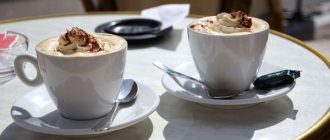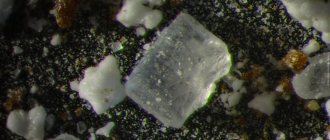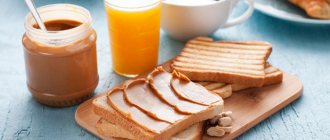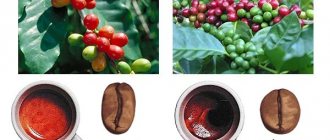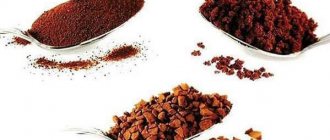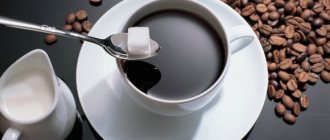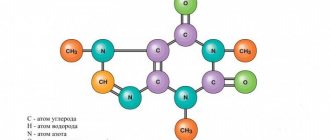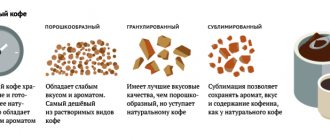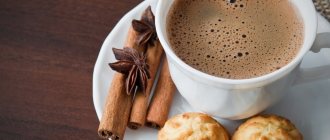Coffee is consumed by most of the globe and is the most traded commodity after oil. In recent years, more and more people are concerned about their health and counting the calories they consume, so they are concerned about the calorie content of coffee without sugar. According to statistics, on average people drink 2-4 cups of coffee a day, some even 5-6. And with such volumes, it is important to know whether you will exceed your norm.
How many calories are in coffee without sugar?
Coffee is an extremely low calorie product; on average, it does not exceed 5-6 kcal per 100 grams. Even if you drink 5 cups of 200 ml, the total amount of calories will be about 50-60. With an average rate of 1700 (for women) and about 2000 (for men), 50 is a very small number that will not have a serious impact. That is, you can drink almost liters of coffee without sugar and other additives, and it will not cause obesity. Another thing is that more than 5-6 cups a day is not recommended by doctors due to an excess of caffeine, fatty acids and other components.
Calorie table for coffee and coffee drinks without sugar and other additives
| Drink | Portion, ml | Calories per serving |
| Ristretto | 15 | 1 |
| Espresso | 30 | 2 |
| Americano | 180 | 2,2 |
| Americano double | 240 | 4,4 |
| Filter coffee in a drip coffee maker (regular) | 220 | 2 |
| Filter coffee in Chemex | 240 | 3 |
| Filter coffee in an AeroPress | 220 | 3,5 |
| Filter coffee in French press | 200 | 4 |
| Coffee brewed with cold water | 240 | 6 |
| In Turkish, in cezve | 200 | 4 |
| Soluble granular | 200 | 12 |
| Soluble freeze-dried | 200 | 24 |
| Chicory | 240 | 46 |
| Green coffee | 220 | 0 |
| Decaffeinated coffee | 220 | 5 |
Types of coffee drinks: how much milk and calories they contain
As a rule, milk coffee drinks are prepared on the basis of espresso, single or double. Different chains have their own recipes and volumes of the drink, and therefore the calorie content. The table below presents popular drinks from well-known chain establishments.
| Name of chain and type of drink | A portion | Calorie content |
| Coffeemania Cappuccino | 330 | 90 |
| Coffeemania Cappuccino | 450 | 160 |
| Coffeemania Latte | 330 | 156 |
| Coffeemania Latte | 450 | 218 |
| Coffeemania Flat White | 430 | 130 |
| CoffeeHouse Double Cappuccino | 100 | 64 |
| CoffeeHouse Latte | 100 | 44 |
| Chocolate Cappuccino | 100 | 35 |
| Chocolate Latte | 400 | 220 |
| Chocolate Cappuccino Light | 320 | 125 |
| Starbucks Cappuccino Grande | 350 | 140 |
| Starbucks Latte Grande | 350 | 220 |
| Starbucks Latte low fat | 350 | 112 |
| Starbucks Cappuccino low fat | 100 | 20 |
| McDonalds Cappuccino | 300 | 123 |
| McDonalds Latte | 300 | 132 |
Calorie content of natural black coffee without sugar
Natural grains contain natural sugars and fats, as well as some protein, and the fresher the roast, the more of them. During long-term storage, they partially evaporate, especially if you buy already ground coffee and store it in unsealed packaging. If you grind freshly roasted beans immediately before drinking and prepare coffee, its calorie content can increase by 0.5-1 kcal per 200 ml cup.
The longer the grains are in contact with water, the more nutrients are released and transferred into the drink. Therefore, in espresso or ristretto, which are prepared quickly in coffee machines, the number of calories is minimal - usually 1 kcal per serving. A drink prepared in a filter contains more calories, about 3-5 per 200-240 ml cup. French press or Turkish coffee takes the longest to brew and contains about 4 calories per 200 ml.
Calorie content of Arabica and Robusta
Different types of coffee beans have their own characteristics. The most commonly found on the market are Arabica and Robusta; mixtures of them are often sold (60% Arabica + 40% Robusta).
| Arabica | Robusta | |
| Fats | 15-17% | 10-11% |
| Acids | 5-8% | 7-10% |
| Sahara | 6-9% | 3-7% |
We see that Arabica contains a little more fat and sugar, which will be transferred into the drink when cooked. And the longer your coffee brews, the more calories you'll get. However, for a cup of coffee the difference will be 0.5 - 1 kcal, which for most people, even those who carefully count calories, is not so significant. If you like Arabica, there is no point in switching to Robusta just because this will reduce your diet by 4-5 kcal per day.
Amount of Kcal in different types of coffee
The calorie content of coffee drinks may vary, as it is determined by the calorie content of the ingredients in the composition. Let's look at the most popular types of coffee and their calorie content.
- Natural coffe
Black brewed coffee beans are considered very low in calories. There are 1-2 kcal per hundred milliliters of drink. Thus, by drinking a 200 ml cup of natural grain coffee, you get a maximum of 4 Kcal . Of course, the calorie content of the drink will remain the same if you do not add sugar or milk to it.
- Ground coffee
Ground coffee will also not harm your figure. A 200 ml cup of ground coffee will bring you only 2 Kcal.
- Instant coffee
Instant coffee has a higher calorie content, which is 7 Kcal per hundred milliliters of drink. By drinking a standard mug with a volume of 200-250 milliliters, you get about 14-17.5 kcal. And if you add sugar and drink this drink two or three times a day, it can quickly affect your figure. You can read more about the benefits and harms of instant coffee here. You can learn more about freeze-dried instant coffee: how it is produced, which brands of coffee are best to choose here.
- Americano
Americano coffee consists of espresso and water. Accordingly, the calorie content of this drink is low . A 450-milliliter serving of Americano will bring you only 15 kcal, as will a serving of lungo coffee. Considering the volume and good taste, we conclude that Americano coffee is a good option.
- Latte
Latte contains espresso, milk and foam. Obviously, the most high-calorie ingredient in a latte is milk, which adds “weight” to the drink. A standard serving without sugar contains at least 250 kcal. In our other article we talk about the difference between a latte and a cappuccino.
- Cappuccino
This drink contains espresso and high-calorie ingredients such as cream and sugar. The surface of the cappuccino is covered with milk foam, which is whipped from full-fat milk or cream. Naturally, given the composition of the drink, it simply cannot be low-calorie . A serving of 150-180 ml with sugar and cream will bring you at least 210 Kcal.
Find out how to make an excellent cappuccino here.
- Moccaccino
Moccacino contains espresso, milk, chocolate or chocolate syrup. In addition, according to some recipes, caramel is added to moccacino instead of sugar. An average serving of moccacino has a calorie content of about 290 kcal. Read all about mochaccino coffee and its recipes in the following material.
- Glasse
Glasse is another original drink, which is given a special piquancy by the addition of ice cream. Obviously, such a high-calorie ingredient increases the calorie content of the entire drink. One serving of an incredibly tasty drink will bring you 125 Kcal. Here you can find the best recipes for making iced coffee.
- Frappuccino
Frappuccino is the highest calorie type of coffee . Usually the drink is served in a large container, so while enjoying a Frappuccino, you will get at least 400 Kcal! You can read about what a Frappuccino is by following the link.
- Rough coffee
Rough coffee is a coffee drink with a vanilla-milk flavor. The calorie content of a 150 ml serving of this type of coffee is at least 135 kcal, depending on the added ingredients. Find more detailed information about such a unique coffee drink as raff coffee here.
- Coffee 3 in 1 with sugar and milk powder
A standard 3-in-1 coffee bag is a mixture of coffee, sugar, and milk powder. Typically such a bag weighs 20 grams. Half the weight of the mixture is sugar. 10 grams of sugar have a calorie content of 40 kcal. Powdered milk adds about 30 more kcal. As we found out, the calorie content of coffee itself is insignificant. In total we have about 70 Kcal in one bag.
Tie Guan Yin tea is a drink from China that has unique properties and a magnificent aroma. To experience the full range of its properties and appreciate its rich taste, it is important to know how to brew Tie Guan Yin.
If you're a tea and travel lover, then you'll love this rainforest drink made from a plant called Paraguayan holly. And here you can find out that it makes excellent mate tea, as well as about the properties of this exotic drink.
Calorie content of instant coffee without sugar
Soluble granules or powders contain minimal caffeine, acids, sugars and fats. They are washed out and dissolved during the production process. But the share of natural coffee in instant coffee is often only 15-20%, the rest is additives (thickeners, dyes, concentrates, the addition of corn flour or something similar is often found). Due to the additives, the calorie content increases, and per 100 grams of the finished drink you get 6 kcal in granulated coffee, and 12 kcal in freeze-dried coffee, if you add about 10 grams of dry matter (a heaped teaspoon).
If you add more, or brew a larger cup, the caloric intake will increase proportionally.
Calorie table for different brands of instant coffee
| Per 100 grams | In one teaspoon | |
| Carte Noire | 100 | 10 |
| Egoiste | 90 | 9 |
| Moscow coffee shop on shares | 223 | 22,3 |
| Jardin | 92 | 9,2 |
| Jacobs Monarch | 100 | 10 |
| Tchibo Exclusive | 264 | 26,4 |
| Nescafe Classic | 56 | 5,6 |
| Nescafe Gold | 45 | 4,5 |
| Maxwell House | 100 | 10 |
Calorie content of coffee additives
Black coffee is low in calories, but adding additional ingredients increases its nutritional value significantly. It is worth considering how calorie content is affected by the addition of sugar, milk, cream or condensed milk.
Sugar
An espresso with 1 spoon of sugar will contain 22 kilocalories. Those who like a sweeter option consume even more calories at a time.
Black espresso with 2 spoons of sugar is already 42 kcal
Many people mistakenly believe that the energy value of a drink can be reduced by using a sweetener. In fact, the difference between these products is very small. If one teaspoon of regular sugar contains 20 kilocalories, then the same serving of sweetener will contain 18. Accordingly, it is not advisable to replace one option with another.
Whole milk
Milk is rich in carbohydrates, proteins and fats. Knowing the nutritional value of coffee without milk, counting calories if it is added is not difficult. One tablespoon, taking into account the fat content of milk, contains:
- 1.5% - 9 kcal;
- 2.5% - 11 kcal;
- 3.2% - 12 kcal.
There are 12 calories in a tablespoon of powdered milk, and 6 calories in soy milk.
Skimmed milk
The composition of this product is almost completely free of fat. A tablespoon of skim milk contains only 7 kcal. Accordingly, a mug of espresso coffee with a tablespoon of skim milk will contain 9 calories.
Despite its low nutritional value, skim milk contains vitamins, amino acids, and microelements. This is an excellent option for people who adhere to a diet and healthy eating principles.
Cream
Cream is considered one of the most popular additives. Nutritional value directly depends on the fat content of the product. Taking this criterion into account, a tablespoon will contain the following amount of kcal:
- 10% — 15;
- 20% — 25;
- 30% — 50.
Condensed milk
Very nutritious supplement. Just one teaspoon of condensed milk increases the calorie content of the drink by 36 kilocalories. If you pour in a tablespoon of condensed milk, the energy value will increase to 75. When using condensed milk that does not contain sugar, this figure can be reduced by 2.5 times.
A drink made from coffee beans without any additives is considered low-calorie. When using sugar, milk, cream or other additional ingredients, it becomes significantly more nutritious. This point is extremely important to consider for those who are on a diet, trying to get rid of extra pounds, or simply taking care of their health.
Calorie content of coffee with spices
If you add spices to your coffee drink, be prepared that even 1 gram of calories can increase significantly. The table shows the number of calories in 1 gram of spices, this is about half a teaspoon, without a slide, or 2-3 pieces of spices.
Calorie table of popular spices in coffee
| Spices and seasonings | kcal in 1 g. |
| Cinnamon | 2,5 |
| Carnation | 3 |
| Nutmeg | 5 |
| Dry ginger | 1 |
| A piece of fresh ginger | 3,5 |
| Vanilla | 3 |
| Cardamom | 3 |
Calorie table for popular coffee drinks
So, each type of coffee has its own calorie content, which is determined by its composition and the presence of additives. The table below will help you estimate the calorie content of the most popular coffee drinks.
| Name of coffee | Volume, gram | Calorie content, kcal |
| Natural coffee | 100 | 1-2 |
| Ground coffee | 200 | 4 |
| Instant coffee | 200 | 14 |
| Americano | 450 | 15 |
| Latte | 450 | 250 |
| Cappuccino | 150 | 210 |
| Moccaccino | 450 | 290 |
| Glasse | 450 | 125 |
| Frappuccino | 450 | 400 |
| Coffee 3 in 1 | 200 | 70 |
| Rough coffee | 150 | 135 |
So, coffee is a low-calorie drink. However, various coffee drinks have a higher calorie content due to the presence of more high-calorie ingredients in their composition. This should be kept in mind by those who are watching their figure. However, always remember that the joy of your favorite drink is much more important than carefully counted calories.
Coffee with cream recipe. Calorie, chemical composition and nutritional value.
Nutritional value and chemical composition of "Coffee with cream".
The table shows the nutritional content (calories, proteins, fats, carbohydrates, vitamins and minerals) per 100 grams of edible portion.
| Nutrient | Quantity | Norm** | % of the norm in 100 g | % of the norm in 100 kcal | 100% normal |
| Calorie content | 41.5 kcal | 1684 kcal | 2.5% | 6% | 4058 g |
| Squirrels | 2.1 g | 76 g | 2.8% | 6.7% | 3619 g |
| Fats | 3.3 g | 56 g | 5.9% | 14.2% | 1697 g |
| Carbohydrates | 0.8 g | 219 g | 0.4% | 1% | 27375 g |
| Organic acids | 1.3 g | ~ | |||
| Alimentary fiber | 1.7 g | 20 g | 8.5% | 20.5% | 1176 g |
| Water | 85.5 g | 2273 g | 3.8% | 9.2% | 2658 g |
| Ash | 0.648 g | ~ | |||
| Vitamins | |||||
| Vitamin A, RE | 10.9 mcg | 900 mcg | 1.2% | 2.9% | 8257 g |
| Retinol | 0.01 mg | ~ | |||
| beta carotene | 0.004 mg | 5 mg | 0.1% | 0.2% | 125000 g |
| Vitamin B1, thiamine | 0.012 mg | 1.5 mg | 0.8% | 1.9% | 12500 g |
| Vitamin B2, riboflavin | 0.035 mg | 1.8 mg | 1.9% | 4.6% | 5143 g |
| Vitamin B4, choline | 3.25 mg | 500 mg | 0.7% | 1.7% | 15385 g |
| Vitamin B5, pantothenic | 0.02 mg | 5 mg | 0.4% | 1% | 25000 g |
| Vitamin B6, pyridoxine | 0.004 mg | 2 mg | 0.2% | 0.5% | 50000 g |
| Vitamin B9, folates | 0.511 mcg | 400 mcg | 0.1% | 0.2% | 78278 g |
| Vitamin B12, cobalamin | 0.031 mcg | 3 mcg | 1% | 2.4% | 9677 g |
| Vitamin C, ascorbic acid | 0.02 mg | 90 mg | 450000 g | ||
| Vitamin D, calciferol | 0.008 mcg | 10 mcg | 0.1% | 0.2% | 125000 g |
| Vitamin E, alpha tocopherol, TE | 0.034 mg | 15 mg | 0.2% | 0.5% | 44118 g |
| Vitamin H, biotin | 0.273 mcg | 50 mcg | 0.5% | 1.2% | 18315 g |
| Vitamin K, phylloquinone | 0.1 mcg | 120 mcg | 0.1% | 0.2% | 120000 g |
| Vitamin RR, NE | 2.6737 mg | 20 mg | 13.4% | 32.3% | 748 g |
| Niacin | 2.325 mg | ~ | |||
| Macronutrients | |||||
| Potassium, K | 225.61 mg | 2500 mg | 9% | 21.7% | 1108 g |
| Calcium, Ca | 30 mg | 1000 mg | 3% | 7.2% | 3333 g |
| Magnesium, Mg | 28.73 mg | 400 mg | 7.2% | 17.3% | 1392 g |
| Sodium, Na | 3.48 mg | 1300 mg | 0.3% | 0.7% | 37356 g |
| Sera, S | 2.61 mg | 1000 mg | 0.3% | 0.7% | 38314 g |
| Phosphorus, P | 31.1 mg | 800 mg | 3.9% | 9.4% | 2572 g |
| Chlorine, Cl | 6.18 mg | 2300 mg | 0.3% | 0.7% | 37217 g |
| Microelements | |||||
| Aluminium, Al | 3.4 mcg | ~ | |||
| Iron, Fe | 0.737 mg | 18 mg | 4.1% | 9.9% | 2442 g |
| Yod, I | 0.61 mcg | 150 mcg | 0.4% | 1% | 24590 g |
| Cobalt, Co | 0.02 mcg | 10 mcg | 0.2% | 0.5% | 50000 g |
| Manganese, Mn | 0.0017 mg | 2 mg | 0.1% | 0.2% | 117647 g |
| Copper, Cu | 1.98 mcg | 1000 mcg | 0.2% | 0.5% | 50505 g |
| Molybdenum, Mo | 1.795 mcg | 70 mcg | 2.6% | 6.3% | 3900 g |
| Tin, Sn | 0.89 mcg | ~ | |||
| Selenium, Se | 0.027 mcg | 55 mcg | 203704 g | ||
| Strontium, Sr | 1.16 mcg | ~ | |||
| Fluorine, F | 92.07 mcg | 4000 mcg | 2.3% | 5.5% | 4345 g |
| Chromium, Cr | 0.14 mcg | 50 mcg | 0.3% | 0.7% | 35714 g |
| Zinc, Zn | 0.0177 mg | 12 mg | 0.1% | 0.2% | 67797 g |
| Digestible carbohydrates | |||||
| Mono- and disaccharides (sugars) | 0.7 g | max 100 g | |||
| Galactose | 0.003 g | ~ | |||
| Glucose (dextrose) | 0.002 g | ~ | |||
| Lactose | 0.252 g | ~ | |||
| Essential amino acids | 0.084 g | ~ | |||
| Arginine* | 0.007 g | ~ | |||
| Valin | 0.013 g | ~ | |||
| Histidine* | 0.005 g | ~ | |||
| Isoleucine | 0.011 g | ~ | |||
| Leucine | 0.016 g | ~ | |||
| Lysine | 0.014 g | ~ | |||
| Methionine | 0.005 g | ~ | |||
| Methionine + Cysteine | 0.007 g | ~ | |||
| Threonine | 0.008 g | ~ | |||
| Tryptophan | 0.002 g | ~ | |||
| Phenylalanine | 0.008 g | ~ | |||
| Phenylalanine+Tyrosine | 0.018 g | ~ | |||
| Nonessential amino acids | 0.114 g | ~ | |||
| Alanin | 0.006 g | ~ | |||
| Aspartic acid | 0.013 g | ~ | |||
| Glycine | 0.003 g | ~ | |||
| Glutamic acid | 0.041 g | ~ | |||
| Proline | 0.019 g | ~ | |||
| Serin | 0.01 g | ~ | |||
| Tyrosine | 0.009 g | ~ | |||
| Cysteine | 0.002 g | ~ | |||
| Sterols (sterols) | |||||
| Cholesterol | 5.45 mg | max 300 mg | |||
| Saturated fatty acids | |||||
| Saturated fatty acids | 0.8 g | max 18.7 g | |||
| 4:0 Oil | 0.047 g | ~ | |||
| 6:0 Kapronovaya | 0.028 g | ~ | |||
| 8:0 Caprylic | 0.014 g | ~ | |||
| 10:0 Kaprinovaya | 0.028 g | ~ | |||
| 12:0 Lauric | 0.03 g | ~ | |||
| 14:0 Miristinovaya | 0.209 g | ~ | |||
| 15:0 Pentadecane | 0.016 g | ~ | |||
| 16:0 Palmitinaya | 0.26 g | ~ | |||
| 17:0 Margarine | 0.008 g | ~ | |||
| 18:0 Stearic | 0.143 g | ~ | |||
| 20:0 Arakhinovaya | 0.014 g | ~ | |||
| Monounsaturated fatty acids | 0.414 g | min 16.8 g | 2.5% | 6% | |
| 14:1 Myristoleic | 0.019 g | ~ | |||
| 16:1 Palmitoleic | 0.038 g | ~ | |||
| 18:1 Oleic (omega-9) | 0.319 g | ~ | |||
| 20:1 Gadoleic (omega-9) | 0.003 g | ~ | |||
| Polyunsaturated fatty acids | 0.065 g | from 11.2 to 20.6 g | 0.6% | 1.4% | |
| 18:2 Linolevaya | 0.029 g | ~ | |||
| 18:3 Linolenic | 0.012 g | ~ | |||
| 20:4 Arachidonic | 0.023 g | ~ | |||
| Omega-6 fatty acids | 0.1 g | from 4.7 to 16.8 g | 2.1% | 5.1% |
The energy value of Coffee with cream is 41.5 kcal.
- Serving = 220 g (91.3 kcal)
Primary Source: Created in the application by the user. Read more.
** This table shows the average levels of vitamins and minerals for an adult. If you want to know the norms taking into account your gender, age and other factors, then use the “My Healthy Diet” application.
